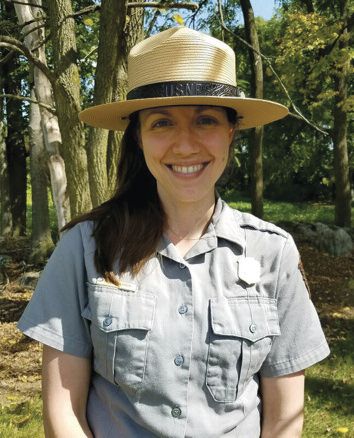 Hollie Lynch began working for the National Park Service as a seasonal interpretive park ranger during her junior year of college.
Hollie Lynch began working for the National Park Service as a seasonal interpretive park ranger during her junior year of college.
"My undergraduate degree is in Social Science and History and I was interested in getting job experience. I returned the following three summers because I fell in love with teaching history in the outdoors," said Lynch, who is the education coordinator for the Chesapeake and Ohio Canal National Historical Park.
In fact, Lynch grew up alongside the Chesapeake and Ohio Canal National Historical Park and has spent a considerable amount of time biking on the towpath.
"Although I still love to bike, I often opt to hike with my two young children and dog," she said. "I like the endurance challenge of biking long distances, but appreciate that hiking allows more time to pause and observe nature along the way, which is especially helpful and exciting for little ones."
Now, as education coordinator of the park, Lynch works closely with park staff to make sure students have a safe and enjoyable experience.
"I develop and manage curriculum-based programs for K-12 students, including the signature 'Canal Classrooms' program. My role involves close collaboration with local school teachers to develop education programming that aligns with national and state learning standards," she said.
"The programs include pre- and post-visit materials and hands-on, age-appropriate activities for students visiting the park. Another core function my position serves is working closely with park partners who help provide the funding and support necessary for our program to operate," she said. "Their support includes transportation scholarships, program supplies and materials, and sponsoring teacher workshops."
When asked about her greatest accomplishment as a recreation professional, Lynch said it is helping students make a connection to the park.
"For some students it is their first time visiting a national park, or for that matter being outdoors and hiking a trail under a tree canopy. For other students who may have been to the park before, but perhaps did not know anything about it, they leave with an understanding of what their local or 'backyard' national park is and an appreciation for it," Lynch said.
"It's hard, perhaps impossible, to measure the outcome of these teachable moments," she said. "I'm thankful that the result of my work is to create these special experiences for students, provide them with the opportunity to connect and learn, and hopefully empower them to become future stewards of the National Park Service."
This year, Lynch was the recipient of the 2017 Freeman Tilden Award, the National Park Service's highest honor for excellence in interpretation and education. Lynch was recognized for her role in developing and implementing a series of innovative curriculum-based park programs for 200 schools in Maryland, West Virginia and Washington, D.C.
"I'm honored to receive the 2017 Freeman Tilden Award and that our work to engage students along the C&O Canal is recognized among many other amazing interpretation and education programs taking place in national parks throughout the country," she said. "It is a wonderful feeling to celebrate the great work we've accomplished the last five years and to know we are making a difference for many teachers and students.
"We currently offer programs at three locations on the C&O Canal, each in a different county/school district. When we develop at a site, I like to first meet with local school officials and introduce them to the park and the resources available to their students," she explained. "From there, the school district helps to guide where the park can best meet the need of its students. For example, one school district wanted to focus on elementary students, another wanted to focus on secondary, and so on. With direction and support from the school district, I plan a curriculum workshop with local school teachers and our park ranger staff.
"Together, we develop one or more curriculum-based programs that marry park resources with curriculum standards. The product is an outdoor experience for students that [are] both fun and meaningful to what they are learning in the classroom," she said.
"We want students to enjoy their time in the park," she added, "but also leave with an understanding of why the park is special and how it is relevant to them today."


